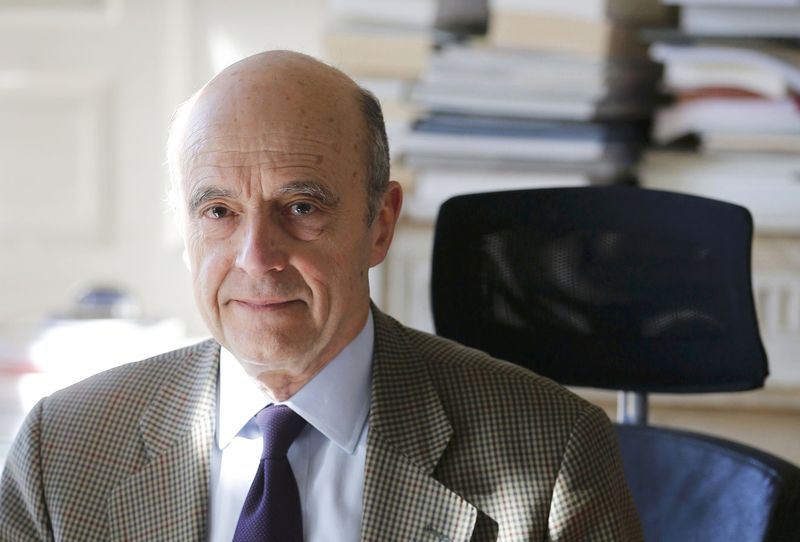By Ingrid Melander
PARIS (Reuters) - He tops French opinion polls and features on the front page of hipster magazines.
At the age of 70, former prime minister Alain Juppé has shrugged off a decades-old image of a grey technocrat and a criminal conviction for misuse of public funds to become a serious contender for France's 2017 presidential election.
Juppé, prime minister from 1995 to 1997, is in the throes of a comeback campaign to convince the conservative Les Republicains party to nominate him rather than ex-president Nicolas Sarkozy for 2017 in primaries to be held in November.
Judging by several polls published over the past week, it seems to be working.
Forty percent of Les Republicains supporters want Juppé to win the November primary, ahead of Sarkozy's 35 percent and far better than all other candidates, a Harris Interactive poll showed.
In the same poll eight months ago, Sarkozy attracted 50 percent of support and Juppé only 26.
If Juppé gets his party's nomination for 2017, it would be bad news for Socialist President Francois Hollande.
Unlike the abrasive Sarkozy, whom left-wing voters love to hate, the mild-mannered mayor of Bordeaux, who ploughs a more centrist furrow, is also popular among his supporters.
And Juppé is by far more popular than either among middle-of-the-road voters who are key to winning a presidential election in France.
"He is clearly a danger for both Sarkozy and Hollande," said Francois Miquet-Marty, the head of Viavoice pollsters.
Viavoice's latest survey shows that 51 percent of French consider Juppé would be a good president. Only 24 percent say the same of Sarkozy and 20 percent of Hollande.
Juppé's biggest asset is that he has turned his age into a strength, pollsters say. He feels familiar and reassuring to voters at a time of crisis, is less divisive than Sarkozy and is not blamed for rampant unemployment as Hollande.
The biggest threat to his 2017 bid: France has a history of falling in love with outsiders in the run-up to a presidential election before rejecting them abruptly. That happened to then Prime Minister Edouard Balladur in 1995.
"There is the risk that he could run out of steam," said Harris Interactive pollster Jean-Daniel Levy. "Alain Juppé has managed to create trust, an image of stability... but the question is whether he will manage to hit the campaign trail differently than Balladur, who was seen as cold and distant."
TOO OLD, TOO COLD?
Seemingly aware of that risk, Juppé is out touring small-town France and saying he wants to hear what ordinary voters have to say. Sarkozy, who is struggling after failing to get a landslide win in December regional elections, is doing the same.
Juppé was long viewed as cold and rigid. One the most striking moments of his career in many voters' minds is when as prime minister in 1995 he caused France's worst unrest since May 1968 by saying he would stand firm on a botched austerity push.
Both Sarkozy and he have been the target of judicial investigations.
But pollsters say surveys show Juppé's suspended 2004 jail sentence for abuse of public funds - the conservatives illegally used Paris city hall staff for operations while he was party leader - has faded in voters' memory and he is viewed as honest and reliable.
Sarkozy's popularity, however, has taken a hit from a series of investigations into election campaign financing.[nL5N0Y621Q].
Both men are out and about with book projects.
Juppé published one on migration and security this month, where he takes a step to the right with tough proposals aimed at attracting Sarkozy's supporters. Sarkozy just announced he will publish his own book next Monday.
Juppé, who plans another book on his economic policies, has already said he would scrap the 35-hour week, which Sarkozy also criticises. With both trying to attract each other's supporters, Juppé says the main difference between them is one of character.
In a sign that Juppé is starting to worry 2017 candidates of all parties, Socialist party leader Jean-Christophe Cambadelis last week called him a "great-grand-father".

Last time a French presidential candidate was mocked for his age it was Jacques Chirac in 2002. And he won.